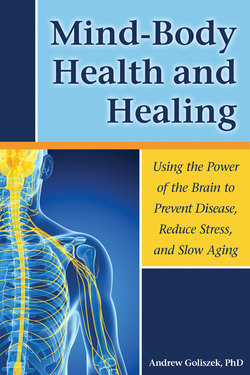Читать книгу Mind-Body Health and Healing - Andrew Goliszek - Страница 13
На сайте Литреса книга снята с продажи.
ОглавлениеCHAPTER FOUR
Conditioning the Brain to Prevent Illness
There’s not a disease or illness in the world that is not, in one way or another, affected, intensified, or triggered by stress. From the common cold to cancer, every disease begins with a breakdown in immunity and homeostasis, which then triggers even further attacks on the immune system. The disease progresses until it’s either eliminated by natural defenses or medication(s), or thrives and overwhelms the body’s organ systems. One of the most significant contributing factors in the latter process is physical or emotional stress.
Long before humans ever thought about stress, our early ancestors depended on the stress response for their survival. Fleeing predators, fighting enemies, and surviving a hostile world didn’t leave much room for the weak and helpless. Those able to respond to life-threatening events survived and passed their genes on to their offspring. Those who could not eventually died off.
With each generation, the ability to respond to stress increased and evolved to what it is today: an amazingly efficient and complex set of reactions that protect us during times of emergency, but when left unchecked can make us sick and trigger a variety of illnesses. The origin of modern stress, then, has its roots in our primitive past. What began as a vital defense mechanism has morphed into the leading cause of disease and illness in the modern world. And as society becomes ever more complex, and every succeeding generation is forced to cope with new kinds of stressors, we’re finding that more and more people are falling victim to stress-related health disorders.
Stress Begins in the Brain
Stress is categorized as acute or chronic, physical or emotional. Anyone who’s ever experienced intense physical trauma knows exactly what physical stress can do to health and well-being. Interestingly, studies have found that, in terms of overall effect on the body, emotional or psychological stress can be even more damaging than physical stress. But regardless of the type of stress the human body encounters, especially if it’s long-term or chronic, the impact on organ systems is profound. During stress, powerful signals from the brain and the nervous system either stimulate or inhibit various physiological functions. And by interfering with important chemical pathways, stress blocks the body’s production of white blood cells, which then inhibits immunity.
One of the main reasons stress affects us so much is that virtually every organ system in our body reacts in a collective effort to protect us from whatever triggered stress in the first place. It’s the classic “fight or flight” response that served our ancestors so well in the past and today continues to help us in emergency situations. But the body doesn’t recognize nuances or variations of stress; it simply interprets the brain’s message that we have encountered some sort of “threat” and must mobilize to deal with it.
Everyone differs in what they view as stressful or potentially stressful. But the main causes of stress are the same: fear, both physical and psychological; uncertainty about life events, resources, finances, and situations; negative perceptions and attitudes regarding work, home-life, society, etc.; and change, whether it’s positive or negative.
